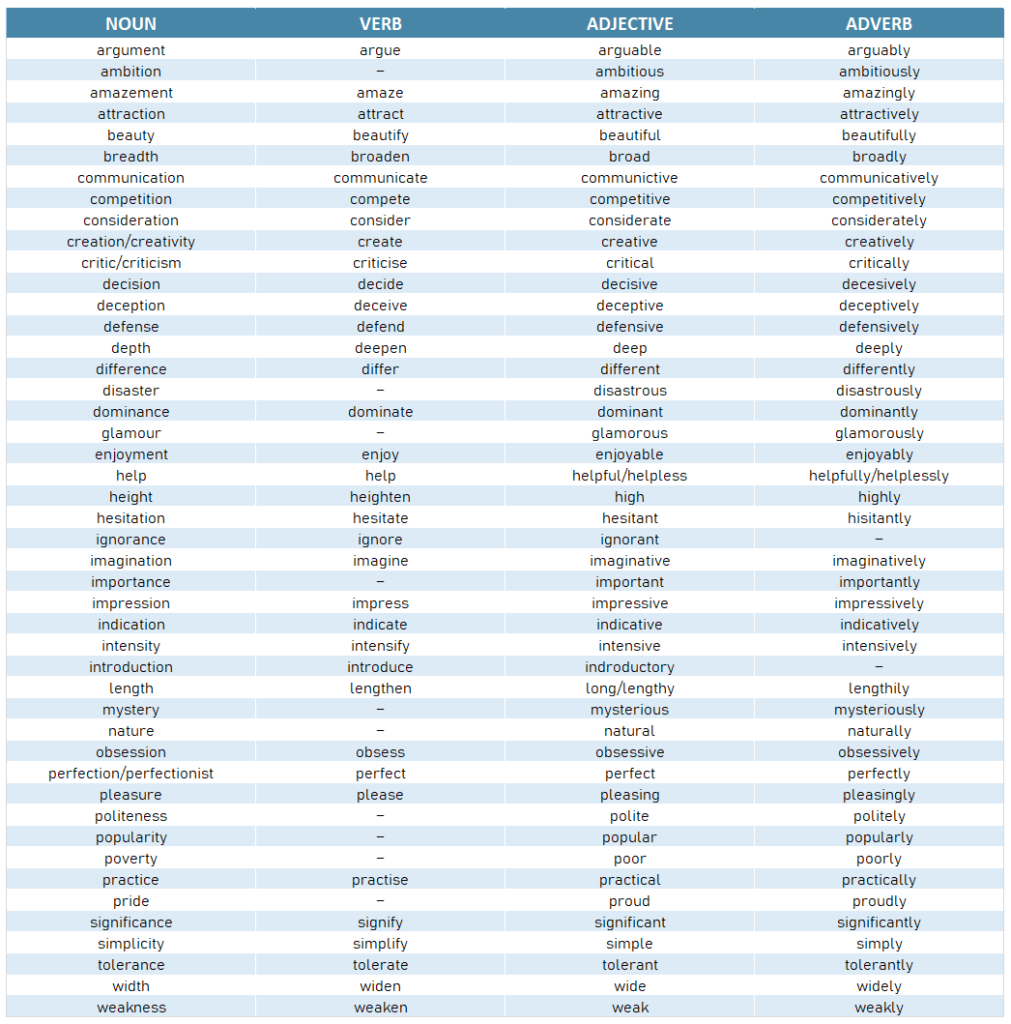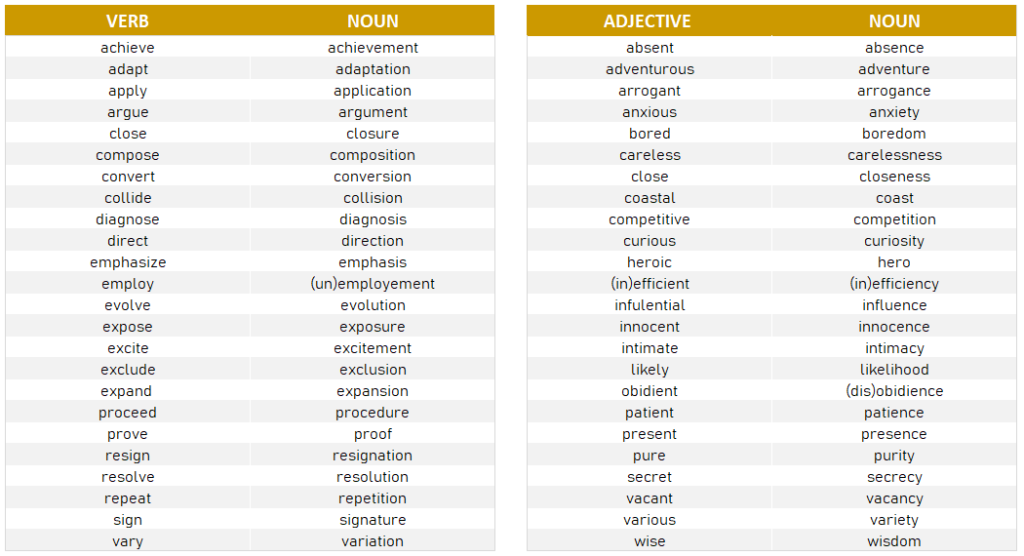
Word Bank
A word bank (not The World Bank) is a list of words created by a teacher to help the student broaden their vocabulary and improve writing, speaking and spelling skills. This one, additionaly, gives an insight into some differences in pronunciation, provides lots of synonyms for overused words and also lists some catchy phrases, called Binomials to make your English sound more vibrant and exciting.
HOMOGRPAHS
Words with same spelling but different pronunciation and meaning
Homographs are usually a pair of words that are spelled the same way, and may or may not be pronounced the same way. The difference can be usually noticed as a shift in the accented syllable. i.e. The word present is pronounced /PRE-sent/ as a noun and pre-SENT as a verb.

accent /n/ /ˈæk.sənt/ – a typical way of pronouncing words
accent /v/ /əkˈsent/ – to emphasize something
bow /n/ /bəʊ/ – a weapon for shooting arrows
bow /v/ /baʊ/ – to bend your head or body usually to show respect
discount /n/ /ˈdɪs.kaʊnt/ – a reduction in price
discount /v/ /dɪˈskaʊnt/- to consider an idea or a fact not important
escort/v/ /ɪˈskɔːt/ – to go with a person or vehicle
escort /n/ /ˈes.kɔːt/- someone who goes with another one to a social event
lead /v/ /liːd/ – to control a group of people or to be the first
lead /n/ /led/ – a type of heavy metal
present /n/ /ˈprez.ənt/ – something that is given to you (a gift)
present /v/ /prɪˈzent/ – to give, provide or make something know
minute /n/ /ˈmɪn.ɪt/ – 60 seconds
minute /adj/ – /maɪˈnjuːt/ – extremely small
object /n/ /ˈɑːb.dʒɪkt/– a think you can see or touch
object /v/ /əbˈdʒekt/ – to express opposition or dislike
project /n/ /ˈprɒdʒ.ekt/ – a piece of planned work or activity
project /v/ /prəˈdʒekt/ – to calculate an amount or a number
tear /n/ /tɪər/ – a drop of water from the eye
tear /v/ /teər/ – to pull pieces off
wind /n/ /wɪnd/ – a current of air
wind /v/ /waɪnd/ – to turn or to cause smt to turn
produce /n/ /ˈprɒdʒ.uːs/ – fresh fruits and vegetables
produce /v/ /prəˈdʒuːs/ – to make or bring smt into existence
CONFUSING WORDS
English language is full of confusing words. You spelled the word correctly but might have used a wrong word.
Even an advanced spell checker has had a hard time to spot the mistake as there is no spelling error in the sentence above, but we used an adjective /LOOSE/ instead of verb /LOSE/.
And not only the written English causes problems, there are a lot of pronunciation issues too. Some words are spelled the same way but have different meaning and pronunciation. If you think now English is a crazy language, you are probably right. Below you can find some of the most commonly confused and misused words in English.
/n/=noun, /v/=verb, /adj/=adjective, /adv/=adverb, /prep/ = prepositon

advice /n/ – I need good advice.
advise /v/ – I advised him not to leave the company.
affect/v/ – I was deeply affected by the movie.
effect /n/ – I took a painkiller but it didn’t have any effect.
disinterested /adj/ – We need somebody disinterested to make a fair decision.
uninterested /adj/ – The children were completely uninterested in doing the housework.
bear /v/ – to support heavy weight or to endure difficulties
bare /adj/ – naked or uncovered (barefoot)
lose /v/ – I usually lose my keys.
loose /adj/ – 1) not fasten in place 2) not tight clothes
complement /v/- to make something else seem better or more attractive
compliment /n/ – a polite remark to sb that you like their appearance or what they’ve done
breath /n/ – the air that goes in and out of your lungs
breathe /v/ – to exhale or inhale air
economic /adj/ – related to trade, industry or money
The economic situation looks promising.
economics /n/ – the way in which trade, industry, or money is organized
economical/adj/ – using little money, energy or time
Modern cars are very economical on fuel.
altar /n/ – a type of table used in religious ceremonies
alter /v/ – to change
course /n/ – a set of classes on a particular subject
curse /v/ – using offensive words in anger
accept /v/ – to agree to receive or do
except /prep/ – not including
desert /n/ /ˈdez.ət/ – an arid area covered with sand or rocks
dessert /n/ /dɪˈzɜːt/ – sweet food eaten after the main meal
moral /n/ – a standard of good behavior or honesty
morale /n/ – the amount of confidence and happiness that a group of people have (working morale)
horse /v/ – a large animal with four legs
hoarse /adj/ – a rough voice of a peson, often because of a sore throat
slot /n/ – a long, narrow hole, especially one for putting coins into
sloth /n/ – a mammal that moves very slowly and lives in trees
continually /adv/ – an event that happens again and again
continuously /adv/ – without a pause or interruption
brake /n/ – a stopping device
break /v/ – to separates smt into two or more pieces
SYNONYMS
A synonym is a word or phrase that means the same or nearly the same as another word in the same language, for example, ‘courageous’ and ‘bald’ are synonyms of ‘brave’.

perfect ꟾ flawless ꟾ magnificent ꟾ superb ꟾ outstanding ꟾ brilliant ꟾ excellent
important ꟾ crucial ꟾ significant ꟾ vital ꟾ imperative ꟾ paramount
big ꟾ enormous ꟾ vast ꟾ gigantic ꟾ huge ꟾ massive
small ꟾ tiny ꟾ minute ꟾ minuscule ꟾ meager
rich ꟾ well off ꟾ loaded ꟾ affluent ꟾ well-heeled ꟾ wealthy
poor ꟾ penniless ꟾ broken ꟾ needy ꟾ destitute ꟾ indigent
fast ꟾ quick ꟾ rapid ꟾ swift ꟾ brisk
slow creeping ꟾ sluggish ꟾ hungry starving ꟾ ravenous ꟾ famished
dangerous ꟾ alarming ꟾ perilous ꟾ risky ꟾ precarious ꟾ critical
real ꟾ genuine ꟾ authentic
happy ꟾ cheerful ꟾ contended ꟾ glad ꟾ delighted ꟾ upbeat ꟾ elated
thin ꟾ skinny ꟾ lanky ꟾ slim ꟾ slender
fat ꟾ obese ꟾ chunky ꟾ chubby ꟾ plump ꟾ corpulent
modern ꟾ contemporary ꟾ up-to-date ꟾ stylish ꟾ trendy ꟾ
fashionable ꟾ elegant ꟾ classy ꟾ smart ꟾ chic ꟾ
difficult ꟾ challenging ꟾ demanding ꟾ strenuous ꟾ arduous ꟾ uphill
easy ꟾ effortless ꟾ manageable ꟾ clear ꟾ cinch ꟾ painless ꟾ simple
start ꟾ begin ꟾ commence postpone ꟾ delay ꟾ put off
explain ꟾ clarify ꟾ interpret refuse ꟾ reject ꟾ decline ꟾ rebuff ꟾ defy
choose ꟾ select ꟾ elect ꟾ opt ꟾ pick manage ꟾ handle ꟾ deal with
let ꟾ permit ꟾ allow collect ꟾ gather ꟾ pick (up)
need ꟾ claim ꟾ demand ꟾ require forbid ꟾ prohibit ꟾ ban
achieve ꟾ fulfill ꟾ realize ꟾ accomplish ꟾ reach
have ꟾ own ꟾ possess stop ꟾ cease ꟾ quit ꟾ halt
think ꟾ imagine ꟾ presume ꟾ reckon ꟾ expect ꟾ anticipate
hate ꟾ loathe ꟾ dispise ꟾ adhore
BINOMIALS
In linguistic, a binomial is an expression (a noun phrase) consisting of two words usually linked by a conjunction (AND, OR) or by a preposition. Binomials very often have a similar sound pattern like WINE and DINE or the words are antonyms like WIN and LOSE. The order of the words is not reversible. Binomials are frequently used by native English speakers; by learning them, you will not only be able to understand them better but your speech will also be more diverse.

back and forth – going to and from a place
People ran back and forth carrying buckets of water to put out the fire.
by and large – in general, on the whole
We had a few setbacks, but by and large the situation is OK.
bit by bit – gradually, a small amount at a time
Due to lack of money, the building progressed bit by bit.
black and blue – covered in bruises
After falling off the bike, his legs and arms were black and blue.
done and dusted – completely finished
It’s finally done and dusted. Let’s go out and have a bite!
first and foremost – the most important
First and foremost we have to focus on reducing the expenses.
give or take – not an exact number or amount
Each day we start at 8AM, give or take a few minutes.
sick and tired – annoyed or frustrated with smt or sb to the point of losing one’s temper
I am sick and tired of doing all the household chores.
wine and dine – to entertain somebody with fine drinks and food
The company wined and dined their clients, promoting their articles and services.
neat and tidy – clean and organized
I have no idea how he keeps his house so neat and tidy.
safe and sound – not injured or hurt in any way
We got home from our round the world tour safe and sound.
pros and cons – the good and the bead sides of something
We spent hours discussing the pros and cons of setting up an own company.
win or lose – whether you succeed or fail
Win or lose, we’re proud of you coming so far.
heart and soul – do smt with great deal of enthusiasm and energy
I really put heart and soul into this project and you’re still not satisfied.
hustle and bustle – a lot of noisy activities
I got away from the hustle and bustle of London and settle down in Woodford.
ins and outs – all the detailed point and facts of a situation
Mr Brown will provide you the ins and outs of the forthcoming event.
live and learn – to learn from experiences, usually said when we hear something surprising
Cindy has two adult sons? Well, you live and learn. I never knew that.
loud and clear – easy to understand, said clearly
I think the message was loud and clear enough. Why didn’t you come?
odds and ends – miscellaneous items or articles, usually not the important ones
We brought over all the furniture only a few odds and ends remained in the office.
ups and downs – to experience good and bad things
Tony and Kelly have had their share of ups and downs but they’re still together.
do’s and don’ts – a set of basic rules
Here’s a list of do’s and don’ts if you want to live in this apartment.
down-and-out (adj)- having nowhere to live, no job, and no real hope of improving the situation
A new hostel is being built for the down-and-outs.
on and off – occasionally, not in a regular or continuous way
He worked for years on and off but was never able to find a permanent job.
short and sweet – something is done quickly and comes straight to the point
The manager’s speech was short and sweet: he told the employees exactly what they needed to know.
WORD FORMATION
Word formation is a very important aspect of most languages, and English is certainly no exeption. The term itself refers to the process how new words are created by adding prefixes and/or a suffixes to the word stem (morpheme). The chart below is useful for all language learners but especially to those who are planning to take the Cambridge English exam. (FCE/CAE)




brightonschool.info
© Copyright 2023
® All rights reserved
GRAMMAR
Tenses
Passive
Conditionals
Adjectives
Adverbs
Prepositions
VOCABULARY
Collocations
Word Bank
Phrases
Idioms
Syllable Stress
Common Mistakes
TEST YOUR ENGLISH
Take a Level Test
Test Bank
INFO
About Us
Get in Touch
Disclaimer